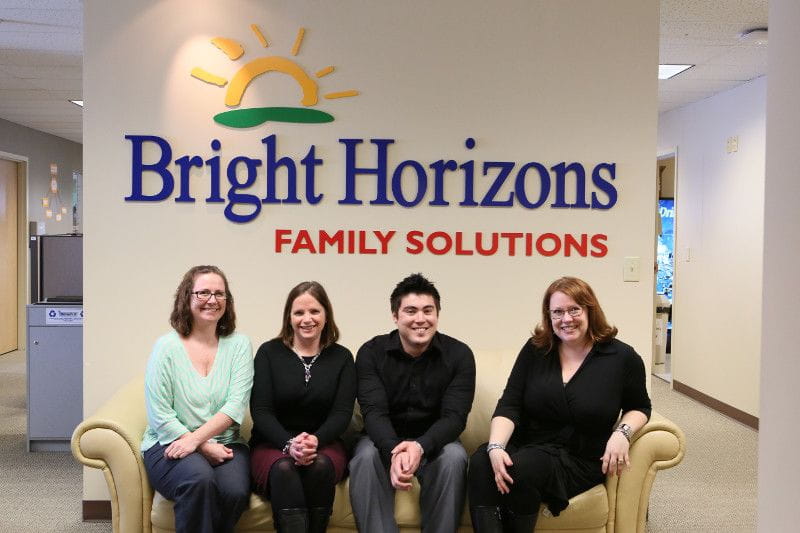This week, Solutions at Work LIVE is hosting employer discussions about work/life insights and innovative approaches to employee assistance. Follow along at #SAWLIVE and check back next week for all the news from this Bright Horizons annual event.
Sometime back in the late 1990s, I uttered the following words:
"Who would ever pay delivery for an internet order when you can just pick something up in the store?"
Cut to 2015; today, I don't even leave my house to buy socks.
The raised eyebrows are understandable. Stories like this and this characterize for-profits like a bunch of guys standing in back alleys offering overpriced degrees from the inside pockets of their trench coats.
But EdAssist's Mark Ward says the characterization is unfair there's a lot of good going on, too.
There's certainly a lot of agreement that the current higher-ed model needs some help. Traditional private campuses are charging upwards of $60,000 for four years. Student debt, now collectively surpassing a trillion dollars, is haunting students well into adulthood, many already wondering at the ripe old age of 22 if they'll ever be able to retire or purchase a home. While top-tier campuses are thriving, many of the country's 4,000-plus schools are mid-tier campuses that are struggling to find students.
On the other end of the spectrum are companies that need to advance employee skills to fill gaps left by exiting Baby Boomers. There are also a growing number of adult students who want to improve their skills but don't have the time or money for a traditional degree.
For-profit education has been stepping up to those needs in a way that traditional schools haven't, says Mark. For that reason, they're a favorite among corporate tuition assistance programs, and generally in the top three institutions into which corporate students put their money.
Mark points to an influx of MOOCs, certificate programs, and schools like Arizona State that are opening up their academic catalogs online. All of that's happened because of people asking, "How's the system changing?" and "What do we have to do to keep up?"
"Until recently, traditional schools did not offer online programs with the same type of flexible schedules that met the needs of our workforce," Mark wrote not long ago.
All of this signals that college may be on the cusp of evolution. And for those tempted to assume that a radical idea like for-profits could never get widespread acceptance... just remember that once upon a time, e-shopping was considered a niche market.
I'm reminded of that every time I go online to buy socks.
Sometime back in the late 1990s, I uttered the following words:
"Who would ever pay delivery for an internet order when you can just pick something up in the store?"
Cut to 2015; today, I don't even leave my house to buy socks.
For-Profit Education at a Crossroads
When it comes to higher education, this may well be where for-profit colleges currently find themselves - standing at the intersection of "Is their education worth it?" skepticism and "More traditional schools are copying their model" acceptance.The raised eyebrows are understandable. Stories like this and this characterize for-profits like a bunch of guys standing in back alleys offering overpriced degrees from the inside pockets of their trench coats.
But EdAssist's Mark Ward says the characterization is unfair there's a lot of good going on, too.
Changing the Models of Higher Education
Yes, there are some questionable practitioners that will need to be weeded out. But like any upstart, he says, what the for-profits have is the opportunity to usher in change.There's certainly a lot of agreement that the current higher-ed model needs some help. Traditional private campuses are charging upwards of $60,000 for four years. Student debt, now collectively surpassing a trillion dollars, is haunting students well into adulthood, many already wondering at the ripe old age of 22 if they'll ever be able to retire or purchase a home. While top-tier campuses are thriving, many of the country's 4,000-plus schools are mid-tier campuses that are struggling to find students.
On the other end of the spectrum are companies that need to advance employee skills to fill gaps left by exiting Baby Boomers. There are also a growing number of adult students who want to improve their skills but don't have the time or money for a traditional degree.
For-profit education has been stepping up to those needs in a way that traditional schools haven't, says Mark. For that reason, they're a favorite among corporate tuition assistance programs, and generally in the top three institutions into which corporate students put their money.
Lower Cost, Higher Value Tuition
These newcomers are opening eyes to new models of higher education. Are they a replacement for traditional schools? No. But it's going to be up to schools, employers, and the students themselves to keep refining the current model and striving to find a system that works.Mark points to an influx of MOOCs, certificate programs, and schools like Arizona State that are opening up their academic catalogs online. All of that's happened because of people asking, "How's the system changing?" and "What do we have to do to keep up?"
"Until recently, traditional schools did not offer online programs with the same type of flexible schedules that met the needs of our workforce," Mark wrote not long ago.
All of this signals that college may be on the cusp of evolution. And for those tempted to assume that a radical idea like for-profits could never get widespread acceptance... just remember that once upon a time, e-shopping was considered a niche market.
I'm reminded of that every time I go online to buy socks.





